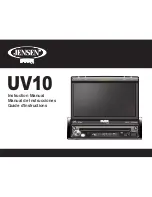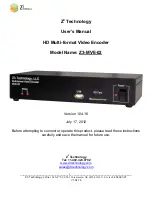
15
US
There is a noise on the image or sound.
The signal from the
transmitter is weak.
The unit is influenced by
other electromagnetic
radiation.
c
Reorient the dedicated antenna (page 12).
c
Set the transmitter closer to the dedicated antenna.
c
If there are any obstacles (especially metallic) between the
transmitter and the receiver, remove them.
If you set the transmitter or the receiver (the dedicated antenna)
in a cabinet, relocate out of cabinet.
c
Reorient the dedicated antenna to minimize the problem (page
12).
c
When you are using a microwave oven near the dedicated
antenna, electromagnetic interference occurs in the unit, but
stops if you stop using the microwave oven.
c
When you are using a cordless phone, a wireless LAN,
Bluetooth equipment such as same frequency (2.4 GHz)
wireless equipment as the unit near the dedicated antenna,
change the CHANNEL switch (frequency) to another frequency
to avoid interference, or set the unit away from the interfering
equipment.
You cannot use a wireless LAN when you started using the unit.
This malfunction occurs
as a result of the unit and
wireless LAN’s frequency
being the same.
c
Change to another frequency so as not to influence the wireless
LAN.
c
Set the transmitter away from the equipment using the wireless
LAN.
You cannot operate the remote control.
The remote control signal
does not get to the
receiver’s infrared
receiver.
The signal from the
transmitter (IR Blaster)
does not reach the infrared
receiver of the A/V
equipment connected to
the transmitter.
c
Point and operate the remote control from a position that faces
the receiver.
c
If there are any obstacles between the receiver and the remote
control, remove them.
c
Make sure to connect the IR Blaster to the transmitter correctly.
c
Set the infrared position (forefront) of the IR Blaster to the
infrared receiver position of the A/V equipment connected to
the transmitter.
















































